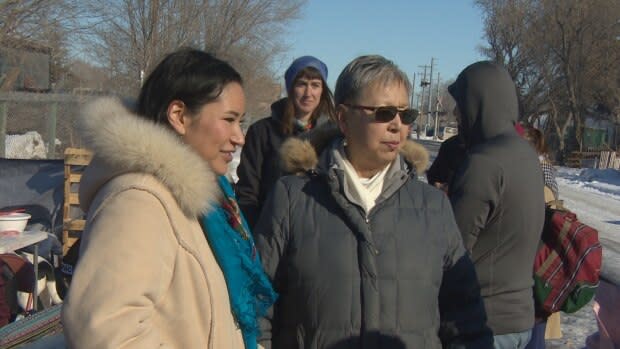Canadian senator visits partial rail blockade in Saskatoon
A high-profile guest visited a partial rail blockade in Saskatoon on Sunday.
Senator Lillian Dyck said she wanted to show her support for the movement, which began in northern B.C. where hereditary chiefs of the Wet'suwet'en have been opposing construction of a pipeline on their traditional lands.
Dyck said she's disappointed by the way Ottawa has handled the demands of the Wet'suwet'en hereditary leadership and their supporters.
"The Federal Government's said they were committed to a nation-to-nation relationship, but yet we could see the situation in Wet'suwet'en developing," she said. "They have one of the clearest cases of where they are ... a sovereign nation and have control over unceded territory. They don't have a treaty, and yet the federal government doesn't treat them like a nation."
Dyck, who is a member of the Gordon First Nation, said she believes Canada is in the midst of an historic event, with blockades and demonstrations popping up around the country.

"It's really sad that in this day and age, the only way we get real attention is by having to do something like this," she said. "It's really not a protest, it's about protecting rights."
Organizer Erica Violet Lee echoed Dyck's sentiment, saying the "tides are turning" in Canada.
She said the appearance by Dyck, a senator appointed by former Liberal prime minister Paul Martin, proves the demonstration is not a partisan issue.
"This is not an issue that affects only a small amount of Canadians, it's an issue that affects everybody on this land," Lee said. "And beyond just the right to clean water, the right to clean air and our livelihoods that we've sustained for thousands of years."
Counter-protesters visit
The partial blockade popped up at the rail lines near Avenue J South around 1 p.m. on Saturday. The demonstrators' goal is to slow down, and potentially halt train traffic through the city, but they have not been obstructing the tracks.
Demonstrators gathered, holding signs, placing pallets on both sides of the track and establishing a small camp of roughly 20 people beside the rail line. The scene was much the same on Sunday.
Counter-protesters and pro-pipeline advocates were in the vicinity on both days. Lee said the counter-protests have made people at the makeshift camp nervous, but said she welcomes anyone as long as they're being peaceful.
Senator Dyck said there's always going to be opposition, but the demonstrations provide an educational opportunity to start a dialogue about the plight of Indigenous people throughout Canadian history.
Lee said her group wants to try to improve life for all Canadians.
"Our goal is to make sure that people are aware that our communities have been suffering for hundreds of years under colonialism and that a little bit of disruption is something very peaceful," she said.
With files from Thomas Gagne

